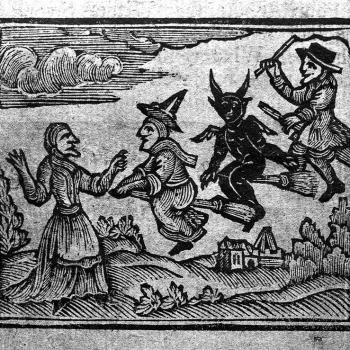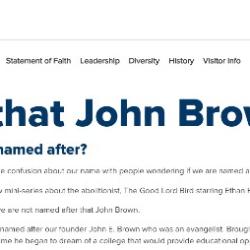Last week Frances Fox Piven, the nationally-known political scientist and activist, visited Messiah College (the college where I have taught American history for the last decade) to deliver our annual American Democracy Lecture. Piven has been under fire of late, largely because some of her work has caught the attention of conservative talk show host Glenn Beck. She has received death threats and hostile emails from Beck's followers—many of them claiming to be evangelical Christians.
It is not my intention to revisit this sad chapter in American political discourse. Instead, I want to reflect on the subject of Piven's lecture: American democracy. Whatever one thinks about the views of Frances Fox Piven, her visit has led to a renewed conversation on campus about the meaning of democracy in American life. Such conversation is good, especially at an institution of higher learning.
What should Christians think about American democracy? A democracy requires universal suffrage and a commitment that all votes have the same value, regardless of the voter's race, class, gender, social position, or economic well-being. When understood in the context of the Bill of Rights, a democratic state must permit the freedom to organize in defense of individual rights. It requires a government that responds to the will of the people.
There is much about this definition of democracy that is compatible with Christianity. Christianity celebrates the belief that all human beings have dignity because they are created in the image of God. It affirms the idea that human beings have been created with free will and the ability to act with reason and responsibility in the public square. In this sense, democracy is good.
But it also has its limits.
Alexis de Tocqueville, the great 19th-century observer of the political culture of the United States, equated American democracy with a system of morality. He wrote that "the majority [in America] possess a power that is physical and moral at the same time, which acts upon the will as much as upon the actions and represses not only all contest, but all controversy." In a democracy the will of the majority becomes the highest good. Sometimes the convictions of the majority will be compatible with Christian ethical teaching, but sometimes they will not.
American history abounds with examples in which democracy as a moral system has come into conflict with a competing moral system informed by something other than the will of the majority. In the mid-19th century, for example, democracy manifested itself in the political principle known as "popular sovereignty." In the context of westward expansion, popular sovereignty meant that the people of a given territory could decide whether or not slavery would be permitted within their boundaries. Such a belief in popular sovereignty meant that it was possible that slavery could extend throughout the continent as long as 51 percent of the people in a given territory thought it was a good idea.
The opponents of "popular sovereignty," such as Abraham Lincoln, believed that the institution of slavery was morally corrupt, whether the majority favored it or not. The same might be said of many anti-slavery Christians who distrusted democracy because it was a deficient way of making moral decisions for the common good and could even lead to injustice.
Or think about democracy in the Jim Crow South. For most of the 20th century, the majority of those living south of the Mason-Dixon Line used democracy to keep blacks segregated and disenfranchised. One does not have to be a Christian to argue that majority rule did not produce an ethically pleasing result during this era.
Changing gears slightly, the other day in my "Teaching History" course at Messiah College we spent some time pondering the question of whether or not we should trust "the people" to make decisions regarding what school kids should learn about American history. What if the people in a so-called "Blue State" do not want their kids to learn about influential conservative figures in American history such as William F. Buckley or Newt Gingrich? What if the people in a "Red State" want to keep Ted Kennedy or Cesar Chavez out of the state history standards? (This actually happened last year in Texas). Perhaps the best people to decide what our students should be learning are teachers, educators, and history professionals who actually know something about the role history plays in a school curriculum.
Democracy is not only a moral system, but it is a self-interested moral system. There have been times where the self-interested nature of a democracy has produced positive results. A belief in democracy has resulted in a political culture where the self-interests of the marginalized—women, labor, African-Americans, to name a few—have been heard.





